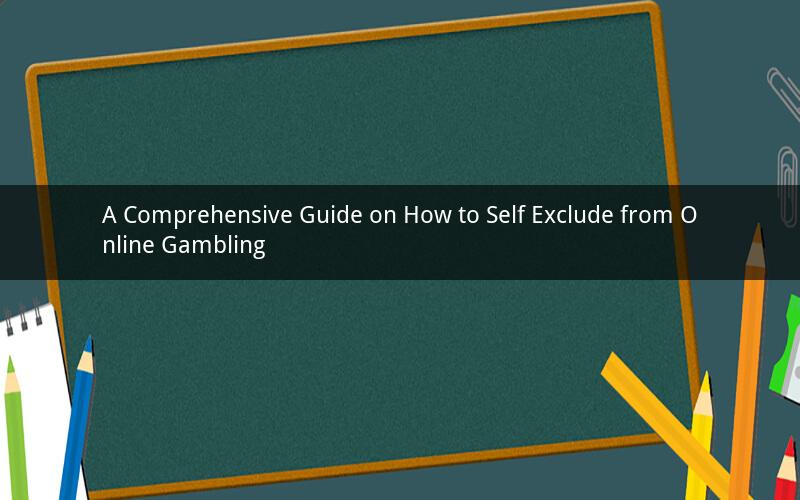
Introduction:
Online gambling has become increasingly popular, but it also comes with its own set of risks and challenges. For some individuals, the allure of online gambling can lead to addiction and financial problems. If you find yourself struggling with online gambling and want to take control of your situation, self-exclusion might be the solution you're looking for. In this article, we will explore how to self-exclude from online gambling, its benefits, and the steps you can take to ensure a safer and healthier lifestyle.
1. Understanding Self-Exclusion in Online Gambling
Self-exclusion is a process where individuals request to be banned from gambling websites and platforms. By doing so, they can avoid the temptation and potential harm associated with online gambling. Self-exclusion is a proactive step towards responsible gambling and can help individuals break the cycle of addiction.
2. The Benefits of Self-Exclusion
a. Avoid Temptation: Self-exclusion ensures that you won't be exposed to gambling websites or advertisements, reducing the temptation to gamble.
b. Financial Protection: By excluding yourself from online gambling platforms, you can protect your finances and prevent financial loss.
c. Mental Health: Self-exclusion can help improve your mental health by reducing stress, anxiety, and depression associated with gambling addiction.
d. Legal Protection: Self-exclusion can provide legal protection against illegal gambling activities and ensure compliance with gambling regulations.
3. Steps to Self-Exclude from Online Gambling
a. Identify Your Problem: Before taking any action, it's essential to acknowledge that you have a problem with online gambling. This involves accepting that your gambling habits have become uncontrollable and are causing harm to your life.
b. Research Self-Exclusion Options: Familiarize yourself with the self-exclusion options available in your country or region. Different countries have different self-exclusion programs, so it's crucial to find the one that suits your needs.
c. Contact the Responsible Gambling Helpline: Reach out to the responsible gambling helpline in your area for guidance and support. They can provide you with information on self-exclusion programs and help you navigate the process.
d. Submit a Self-Exclusion Request: Fill out the necessary forms and submit your self-exclusion request. Ensure that you provide accurate and complete information to avoid any delays or complications.
e. Obtain Confirmation: Once your self-exclusion request is approved, you will receive confirmation from the gambling platform. Keep this confirmation for your records and as a reminder of your commitment to self-exclusion.
f. Seek Support: Surround yourself with a supportive network of friends, family, and professionals who can help you through the self-exclusion process. Consider seeking counseling or joining a support group for individuals struggling with gambling addiction.
4. Alternative Methods of Self-Exclusion
a. Self-Exclusion Apps: There are various apps available that can help you self-exclude from online gambling. These apps can block access to gambling websites and provide reminders about your commitment to self-exclusion.
b. Internet Filters: Use internet filters to block access to gambling websites and advertisements. This can help prevent accidental access and keep you focused on your goals.
c. Financial Controls: Set up financial controls to prevent unauthorized access to your gambling funds. This can include using a budgeting app, setting spending limits, or seeking financial counseling.
5. Overcoming Challenges and Maintaining Self-Exclusion
a. Stay Committed: Self-exclusion is a long-term commitment. Stay committed to your decision and remember why you chose to exclude yourself from online gambling.
b. Identify Triggers: Identify potential triggers that may lead you to relapse and develop strategies to cope with them. This could include avoiding certain situations, seeking support, or practicing relaxation techniques.
c. Seek Support: Maintain contact with your support network and consider seeking professional help if needed. Support from others can provide encouragement and guidance throughout your journey.
d. Celebrate Progress: Acknowledge and celebrate your progress in maintaining self-exclusion. This can help keep you motivated and focused on your goals.
e. Reevaluate as Needed: Periodically reevaluate your self-exclusion plan and make adjustments if necessary. Remember that self-exclusion is a dynamic process that can evolve over time.
Frequently Asked Questions
Q1: How long does self-exclusion last?
A1: The duration of self-exclusion varies depending on the country and program. In some cases, it can last from 6 months to 5 years. It's essential to follow the guidelines of the self-exclusion program you choose.
Q2: Can I self-exclude from all online gambling platforms?
A2: Self-exclusion programs typically cover a range of gambling platforms, including online casinos, sports betting websites, and poker sites. However, it's essential to research the specific coverage of the program you choose to ensure it meets your needs.
Q3: What happens if I violate my self-exclusion?
A3: Violating your self-exclusion can have legal and financial consequences. It may also result in termination of your self-exclusion agreement and a ban from participating in future self-exclusion programs. It's crucial to honor your commitment to self-exclusion.
Q4: Can I self-exclude from mobile gambling apps?
A4: Yes, many self-exclusion programs cover mobile gambling apps. Ensure that you inform the gambling platform about your intention to exclude yourself from mobile gambling apps as well.
Q5: How can I seek help if I'm struggling with self-exclusion?
A5: If you're struggling with self-exclusion, consider seeking help from a professional counselor or joining a support group. They can provide guidance, support, and resources to help you overcome challenges and maintain your commitment to self-exclusion.